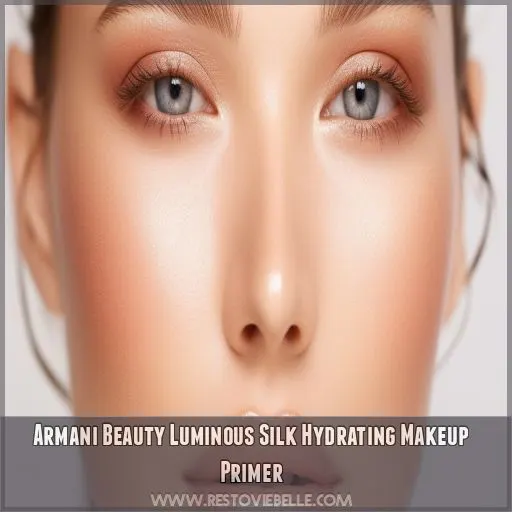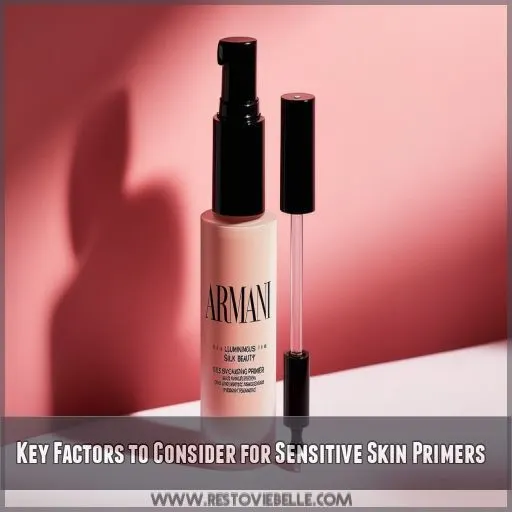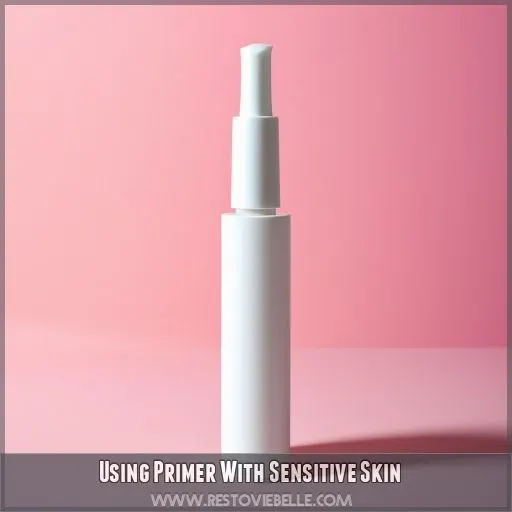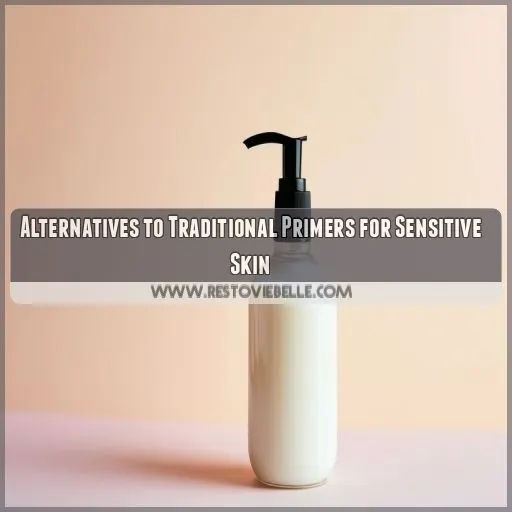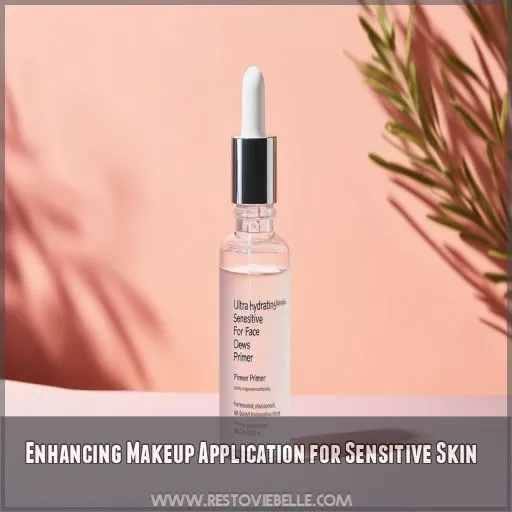This site is supported by our readers. We may earn a commission, at no cost to you, if you purchase through links.
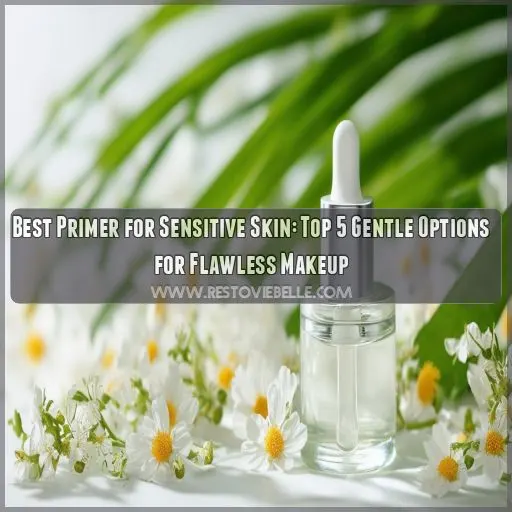 An excellent primer for sensitive skin is fully equipped to rediscover makeup. If you are tired of irritation and reactions, then you’re definitely in the right place.
An excellent primer for sensitive skin is fully equipped to rediscover makeup. If you are tired of irritation and reactions, then you’re definitely in the right place.
We did research and tested top 5 gentle options that promise flawless makeup without compromising on your skin health. From hydrating formulas to soothing ingredients, these primers answer your various needs.
Find out how to get that perfect, smooth canvas for your makeup without causing irritation or putting your sensitive skin at risk.
Table Of Contents
- Key Takeaways
- Top 3 Best Primers for Sensitive Skin
- Armani Beauty Luminous Silk Hydrating Makeup Primer
- Key Factors to Consider for Sensitive Skin Primers
- Using Primer With Sensitive Skin
- Alternatives to Traditional Primers for Sensitive Skin
- Enhancing Makeup Application for Sensitive Skin
- Frequently Asked Questions (FAQs)
- Which type of primer is best for sensitive skin?
- Should I use primer if I have sensitive skin?
- Is Elf primer okay for sensitive skin?
- What can I use instead of primer for sensitive skin?
- Can primer help reduce redness from rosacea?
- How often should primer be replaced?
- Are natural or organic primers better for sensitive skin?
- Can primer be used without foundation on sensitive skin?
- Do tinted primers work well for sensitive skin types?
- Conclusion
Key Takeaways
- Kiss those red-faced days goodbye! With gentle, fragrance-free primers like Milk Makeup’s Hydro Grip, you’ll be saying "hello" to flawless makeup that sticks around longer than your last Netflix binge.
- Your sensitive skin deserves a treat, not a trick. Look for soothing ingredients like aloe vera and chamomile – they’re like a cool cucumber slice for your face, minus the salad vibes.
- Don’t let traditional primers rain on your parade! Natural alternatives like facial oils or DIY concoctions can be your skin’s new BFF. Who knew your kitchen could double as a beauty counter?
- Remember, finding the right primer is like dating – it takes some trial and error. Patch test new products and listen to your skin. When you find "the one," you’ll know it’s love at first application!
Top 3 Best Primers for Sensitive Skin
If you’re looking for the best primers for sensitive skin, consider these top options: Milk Makeup Hydro Grip Primer, Bobbi Brown Face Base, and Dermablend Illuminating Primer Face Makeup. These primers are formulated to be gentle on reactive skin while providing a smooth base for your makeup, helping it last longer and look flawless throughout the day.
1. Milk Makeup Hydro Grip Primer
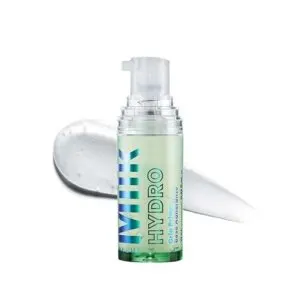
If you’re battling sensitive skin, Milk Makeup’s Hydro Grip Primer might be your new best friend. This gel-based wonder grips your makeup for up to 12 hours while keeping your skin hydrated.
It’s free from common irritants like parabens, silicones, and fragrances, making it a safe bet for reactive skin.
The blue agave extract forms an invisible shield to lock in your look, while hyaluronic acid and hemp seed extract boost hydration.
With 100% of users reporting longer-lasting makeup, it’s a game-changer for those seeking a flawless, comfortable finish.
Best For: Those with sensitive skin seeking a hydrated and long-lasting makeup base.
- Grips makeup for up to 12 hours
- Hydrates skin to prevent makeup meltdown and caking
- Paraben free, silicone free, oil free, fragrance free & gluten free
- Not available
2. Bobbi Brown Face Base
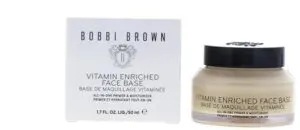
Bobbi Brown Face Base is a game-changer for sensitive skin. This multitasking primer moisturizes while prepping your skin for flawless makeup application.
Its gentle formula, enriched with shea butter and vitamins, soothes and nourishes your delicate complexion. You’ll love how it smooths out imperfections and helps your foundation last longer.
While it’s on the pricier side, a little goes a long way. Users rave about its light, pleasant scent and how it leaves their skin feeling refreshed.
It’s a worthy investment for those seeking a primer that doesn’t irritate sensitive skin.
Best For: Individuals with sensitive skin seeking a multitasking primer.
- Moisturizes and soothes delicate skin
- Smooths imperfections and extends foundation wear
- Pleasant light scent and leaves skin feeling refreshed
- Pricey
- High priced
- Moisturizes skin
3. Dermablend Illuminating Primer Face Makeup
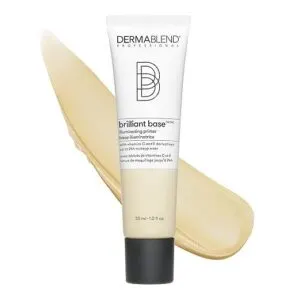
Dermablend’s Illuminating Primer is a game-changer for sensitive skin. It’s packed with antioxidants and gentle on your face, making it perfect for those with easily irritated skin.
You’ll love how it brightens dull complexions and provides long-lasting radiance for up to 24 hours. Plus, it’s fragrance-free and suitable for all skin types and tones.
Whether you use it alone, under foundation, or mixed with your favorite base, this primer has got you covered. With SPF 20, it even protects your delicate skin from sun damage.
Talk about a multitasking marvel!
Best For: Those with sensitive skin looking for a long-lasting, illuminating primer.
- Packed with antioxidants for sensitive skin
- Brightens dull complexions and provides radiance for up to 24 hours
- Fragrance-free and suitable for all skin types and tones
- Not mentioned in the provided context
Armani Beauty Luminous Silk Hydrating Makeup Primer
Armani Beauty’s Luminous Silk Hydrating Makeup Primer is a top choice for sensitive skin, offering a lightweight formula that hydrates and smooths your complexion. It’s designed to create a flawless canvas for makeup application while providing a luminous glow, making it a favorite among users with reactive skin types.
Features and Benefits
Armani Beauty’s Luminous Silk Hydrating Makeup Primer is a game-changer for sensitive skin. Here’s why you’ll love it:
- Hydrating formula nourishes and soothes
- Pore-blurring power for a flawless finish
- Lightweight texture that won’t irritate
- Enhances makeup longevity
This primer’s gentle ingredients work wonders for sensitive complexions. You’ll notice improved skin texture and a radiant glow. It’s like a silk veil for your face, creating the perfect canvas for your makeup.
User Recommendations
You’ll find that users rave about Armani Beauty Luminous Silk Hydrating Makeup Primer. Many with sensitive skin swear by its gentle formula, noting how it creates a flawless base without irritation.
Fans love the silky texture and how it helps their makeup last all day. Some even use it alone for a natural glow.
It’s pricey, but most agree it’s worth the splurge for sensitive skin.
Key Factors to Consider for Sensitive Skin Primers
While choosing a primer for sensitive skin, narrow it down to fragrance-free formulas with soothing ingredients. Seek out products that help with specific problems in your skin, like redness or dryness, so you know that you’re really getting all that you can from your primer.
Fragrance-free Formulas
One will find fragrance-free formulas playing an important role when using a primer on sensitive skin. They reduce the chance of irritation or allergic reactions. On the other note, based on the conducive factors on which Armani’s Luminous Silk is applied, look for hypoallergenic and non-comedogenic options that are going to protect your skin barrier. Consider the following:
• Water-based primers for light hydration
- Hyaluronic acid for moisture locking
No-breakout makeup formulas
- Redness-reducing ingredients
• Products specially formulated for reactive skin
These fragrance-free options let one get the flawless makeup by not compromising with the health of the skin.
Soothing Ingredients
Soothing ingredients are vital in a primer for sensitive skin. Plant-based options like aloe vera and chamomile exhibit anti-inflammatory properties, while ceramides aid in strengthening your skin barrier.
Hypoallergenic-formula-based products reduce the possible irritation of products. Squalane oil gently hydrates without causing clogged pores.
Be it a silicone-based primer to smooth out the face or a mattifying one to control oil, consider these calming components first if you want to keep your sensitive skin happy.
Specific Skin Concerns Addressed
When choosing a primer for sensitive skin, consider specific concerns:
- Acne-prone skin: Look for non-comedogenic, pore-filling primers that won’t clog pores.
- Dry skin: Opt for hydrating primers with moisturizing ingredients.
- Redness: Seek color-correcting primers to neutralize skin tone.
Primer textures and finishes vary, so experiment to find what works best. Remember, ingredients matter – avoid potential irritants and focus on soothing formulations. If traditional primers don’t suit you, explore alternatives like tinted moisturizers or BB creams.
Using Primer With Sensitive Skin
When using primer on sensitive skin, apply a thin layer with clean hands and allow it to set for a few minutes before applying makeup. Be gentle during application and removal, and always patch test new products to avoid potential irritation or reactions.
Application Techniques
When applying primer to sensitive skin, start with clean, moisturized skin. Use your fingertips to gently pat a pea-sized amount onto your face, focusing on areas prone to redness or uneven texture. Don’t rub or tug; let the primer absorb naturally.
For acne-prone or mature skin, consider a pore-minimizing primer.
If you’re DIY-inclined, aloe vera gel can be a gentle, natural alternative to store-bought primers.
Precautions for Reactive Skin
When using primer with reactive skin, always patch test new products on a small area first.
Opt for gentle formulas with calming ingredients to reduce redness and prevent irritation.
If you have oily skin, choose a color-correcting primer or the best primer for oily skin to manage excess sebum.
Stick to fragrance-free options and discontinue use if any adverse reactions occur.
Removal and Skincare Routine
When removing the primer from sensitive skin, follow the steps above.
- Start with an oil-based cleanser to break down primer ingredients
- Follow with a gentle, non-comedogenic cleanser
- Complete with a calming toner or moisturizer
Do a patch test for new products to avoid skin sensitivities. Double cleansing definitely guarantees the removal of the remains. According to Too Faced makeup artist David Razzano, rinse in lukewarm water and don’t scrub too hard. Remember, gentle care is key for reactive skin types.
Alternatives to Traditional Primers for Sensitive Skin
If you’re looking for alternatives to traditional primers for sensitive skin, consider using primer substitutes, natural skincare options, or DIY primer recipes. These alternatives can provide similar benefits to commercial primers while being gentler on your skin and potentially more cost-effective.
Primer Substitutes
If you’re wary of traditional primers, don’t fret! There are alternatives that can prep your sensitive skin for makeup.
Consider using a lightweight moisturizer or facial oil as a primer substitute. These can create a smooth base while hydrating your skin.
Some people swear by aloe vera gel or a gentle sunscreen as primer alternatives.
Experiment to find what works best for your unique skin needs.
Natural Skincare Options
If you’re looking for natural alternatives to traditional primers, consider these options:
- Aloe vera gel: Soothes and hydrates sensitive skin
- Rosewater: Calms redness and balances pH
- Jojoba oil: Mimics skin’s natural sebum, regulating oil production
- Green tea: Antioxidant-rich, reduces inflammation
These organic alternatives offer skin-calming effects without harsh chemicals. Many vegan options are available, focusing on natural ingredients that nourish and protect your sensitive skin. You’ll find these gentler alternatives can work wonders for your complexion.
DIY Primer Recipes
While natural skincare options can be great, you might want to try your hand at DIY primer recipes. These homemade alternatives can be gentler on sensitive skin and allow you to control the ingredients.
Mix aloe vera gel with a few drops of your favorite facial oil for a soothing base.
Or, try blending coconut oil with shea butter for a nourishing primer substitute that won’t cause irritation.
Enhancing Makeup Application for Sensitive Skin
When applying makeup to sensitive skin, opt for gentle, non-irritating products and use light, patting motions to avoid rubbing or tugging. Follow up with a fragrance-free setting spray designed for sensitive skin to lock in your look and provide additional hydration throughout the day.
Makeup Tips for Sensitive Skin
If traditional primers don’t work for you, don’t worry! There are plenty of ways to enhance your makeup application for sensitive skin. Building on our discussion of alternatives, let’s explore some makeup tips that’ll keep your sensitive skin happy and your look flawless:
- Start with a clean slate
- Use gentle, non-comedogenic products
- Apply makeup with soft, clean brushes
- Set your look with a light dusting of translucent powder
Setting Spray Recommendations
To lock in your sensitive skin makeup, opt for a gentle setting spray. Look for alcohol-free formulas with soothing ingredients like aloe vera or chamomile.
Consider the finish you want – dewy or matte – and choose accordingly. For longevity, seek sprays with polymers.
Texture matters; fine mists are less likely to disturb your makeup.
Don’t break the bank; there are budget-friendly options that work wonders for sensitive skin.
Frequently Asked Questions (FAQs)
Which type of primer is best for sensitive skin?
For sensitive skin, opt for a hypoallergenic, fragrance-free primer with soothing ingredients like aloe vera or chamomile. Look for formulas that create a protective barrier, reduce redness, and are free from harsh chemicals or alcohol.
Should I use primer if I have sensitive skin?
Yes, you should use primer if you have sensitive skin. It creates a protective barrier, reducing irritation and redness. Look for fragrance-free, hypoallergenic formulas with soothing ingredients like aloe vera. Primer can help your makeup last longer and minimize skin reactions.
Is Elf primer okay for sensitive skin?
Elf offers primers suitable for sensitive skin, but it’s essential to check ingredients. Look for their hydrating or color-correcting options without fragrances or harsh chemicals. Patch-test before full application to ensure your skin doesn’t react negatively.
What can I use instead of primer for sensitive skin?
You can use lightweight moisturizers, facial oils, or aloe vera gel instead of primer. These options hydrate and protect sensitive skin while creating a smooth base for makeup. BB creams or tinted moisturizers also work well as dual-purpose alternatives.
Can primer help reduce redness from rosacea?
Like a soothing shield, primer can indeed help reduce rosacea-induced redness. You’ll find that a color-correcting primer with green tones can neutralize the flush, creating a smoother canvas for your makeup while calming your sensitive skin.
How often should primer be replaced?
You should replace your primer every 6-12 months. If you notice changes in smell, texture, or performance, it’s time for a new one. Always check the expiration date and store it properly to extend its shelf life.
Are natural or organic primers better for sensitive skin?
Natural and organic primers can be a game-changer for your sensitive skin! They’re often gentler, with fewer harsh chemicals. But remember, "natural" doesn’t always mean better. You’ll still need to check ingredients and patch test carefully.
Can primer be used without foundation on sensitive skin?
Yes, you can use primer without foundation on sensitive skin. It’ll create a smooth base, minimize redness, and protect your skin. Choose a gentle, fragrance-free formula with soothing ingredients. It’s a great option for a natural look.
Do tinted primers work well for sensitive skin types?
Ironically, tinted primers can be a blessing in disguise for sensitive skin. They’ll give you a sheer, natural-looking coverage while providing a protective barrier. Choose ones with soothing ingredients and minimal fragrance for the best results.
Conclusion
Looking for a great, nonirritating primer? Primer can really help in making makeup work with reactive complexions.
You’ve tried gentle options ranging from hydrating formulas to soothing ingredients. Look out for fragrance-free options and application techniques designed especially for sensitive skin.
With such inputs, you’re definitely set to create a flawless makeup base without compromising on the health of your skin.
Love that sensitive skin and show the world your glowing complexion with confidence.

